中国传统节日英文介绍!
- 格式:ppt
- 大小:5.63 MB
- 文档页数:24
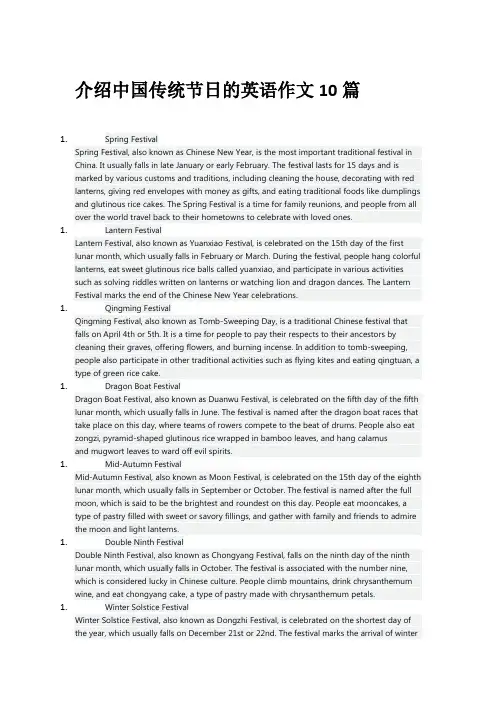
介绍中国传统节日的英语作文10篇1.Spring FestivalSpring Festival, also known as Chinese New Year, is the most important traditional festival in China. It usually falls in late January or early February. The festival lasts for 15 days and ismarked by various customs and traditions, including cleaning the house, decorating with red lanterns, giving red envelopes with money as gifts, and eating traditional foods like dumplings and glutinous rice cakes. The Spring Festival is a time for family reunions, and people from all over the world travel back to their hometowns to celebrate with loved ones.ntern FestivalLantern Festival, also known as Yuanxiao Festival, is celebrated on the 15th day of the first lunar month, which usually falls in February or March. During the festival, people hang colorful lanterns, eat sweet glutinous rice balls called yuanxiao, and participate in various activities such as solving riddles written on lanterns or watching lion and dragon dances. The Lantern Festival marks the end of the Chinese New Year celebrations.1.Qingming FestivalQingming Festival, also known as Tomb-Sweeping Day, is a traditional Chinese festival that falls on April 4th or 5th. It is a time for people to pay their respects to their ancestors bycleaning their graves, offering flowers, and burning incense. In addition to tomb-sweeping, people also participate in other traditional activities such as flying kites and eating qingtuan, a type of green rice cake.1.Dragon Boat FestivalDragon Boat Festival, also known as Duanwu Festival, is celebrated on the fifth day of the fifth lunar month, which usually falls in June. The festival is named after the dragon boat races that take place on this day, where teams of rowers compete to the beat of drums. People also eat zongzi, pyramid-shaped glutinous rice wrapped in bamboo leaves, and hang calamusand mugwort leaves to ward off evil spirits.1.Mid-Autumn FestivalMid-Autumn Festival, also known as Moon Festival, is celebrated on the 15th day of the eighth lunar month, which usually falls in September or October. The festival is named after the full moon, which is said to be the brightest and roundest on this day. People eat mooncakes, a type of pastry filled with sweet or savory fillings, and gather with family and friends to admire the moon and light lanterns.1.Double Ninth FestivalDouble Ninth Festival, also known as Chongyang Festival, falls on the ninth day of the ninth lunar month, which usually falls in October. The festival is associated with the number nine, which is considered lucky in Chinese culture. People climb mountains, drink chrysanthemum wine, and eat chongyang cake, a type of pastry made with chrysanthemum petals.1.Winter Solstice FestivalWinter Solstice Festival, also known as Dongzhi Festival, is celebrated on the shortest day of the year, which usually falls on December 21st or 22nd. The festival marks the arrival of winterand the beginning of longer days. People eat tangyuan, glutinous rice balls filled with sweet or savory fillings, and make offerings to ancestors and deities.1.Ghost FestivalGhost Festival, also known as Hungry Ghost Festival, falls on the 15th day of the seventh lunar month, which usually falls in August or September. The festival is a time to pay respects to the deceased and appease wandering ghosts. People offer food, incense, and paper money to the ghosts and perform traditional rituals to ward off bad luck.ba FestivalLaba Festival falls on the eighth day of the twelfth lunar month, which usually falls in January.The festival is named after the porridge, or laba porridge, that is traditionally eaten on this day.The porridge is made with rice, beans, and various nuts and fruits, and is believed to bring good luck and fortune for the coming year.1.Zhongyuan FestivalZhongyuan Festival, also known as Ghost Month, is a month-long festival that falls on the fifteenth day of the seventh lunar month, which usually falls in August or September. Thefestival is similar to the Ghost Festival, but is a more extended period of time where people pay respects to the deceased and offer food, incense, and paper money to the ghosts. People also perform traditional rituals to ward off bad luck during this time。
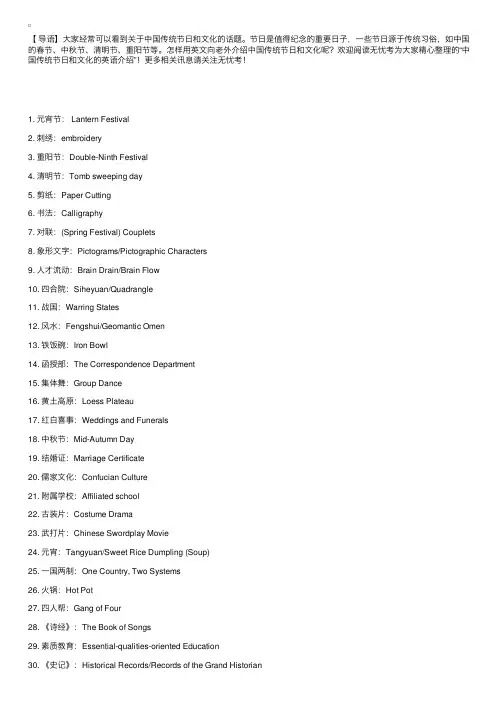
【导语】⼤家经常可以看到关于中国传统节⽇和⽂化的话题。
节⽇是值得纪念的重要⽇⼦,⼀些节⽇源于传统习俗,如中国的春节、中秋节、清明节、重阳节等。
怎样⽤英⽂向⽼外介绍中国传统节⽇和⽂化呢?欢迎阅读⽆忧考为⼤家精⼼整理的“中国传统节⽇和⽂化的英语介绍”!更多相关讯息请关注⽆忧考!1. 元宵节: Lantern Festival2. 刺绣:embroidery3. 重阳节:Double-Ninth Festival4. 清明节:Tomb sweeping day5. 剪纸:Paper Cutting6. 书法:Calligraphy7. 对联:(Spring Festival) Couplets8. 象形⽂字:Pictograms/Pictographic Characters9. ⼈才流动:Brain Drain/Brain Flow10. 四合院:Siheyuan/Quadrangle11. 战国:Warring States12. 风⽔:Fengshui/Geomantic Omen13. 铁饭碗:Iron Bowl14. 函授部:The Correspondence Department15. 集体舞:Group Dance16. 黄⼟⾼原:Loess Plateau17. 红⽩喜事:Weddings and Funerals18. 中秋节:Mid-Autumn Day19. 结婚证:Marriage Certificate20. 儒家⽂化:Confucian Culture21. 附属学校:Affiliated school22. 古装⽚:Costume Drama23. 武打⽚:Chinese Swordplay Movie24. 元宵:Tangyuan/Sweet Rice Dumpling (Soup)25. ⼀国两制:One Country, Two Systems26. ⽕锅:Hot Pot27. 四⼈帮:Gang of Four28. 《诗经》:The Book of Songs29. 素质教育:Essential-qualities-oriented Education30. 《史记》:Historical Records/Records of the Grand Historian31. ⼤跃进:Great Leap Forward (Movement)32. 《西游记》:The Journey to the West33. 除⼣:Chinese New Year’s Eve/Eve of the Spring Festival34. 针灸:Acupuncture35. 唐三彩:Tri-color Pottery of the Tang Dynasty/ The Tang Tri-colored pottery36. 中国特⾊的社会主义:Chinese-charactered Socialist/Socialist with Chinesecharacteristics37. 偏旁:radical38. 孟⼦:Mencius39. 亭/阁: Pavilion/ Attic40. ⼤中型国有企业:Large and Medium-sized State-owned Enterprises41. *:gunpowder42. 农历:Lunar Calendar43. 印/玺:Seal/Stamp44. 物质精神⽂明建设:The Construction of Material Civilization and Spiritual Civilization45. 京剧:Beijing Opera/Peking Opera46. 秦腔:Crying of Qin People/Qin Opera47. 太极拳:Tai Chi48. 独⽣⼦⼥证:The Certificate of One-child49. 天坛:Altar of Heaven in Beijing50. ⼩吃摊:Snack Bar/Snack Stand51. 红双喜:Double Happiness52. 政治辅导员:Political Counselor/School Counselor53. 春卷:Spring Roll(s)54. 莲藕:Lotus Root55. 追星族:Star Struck56. 故宫博物院:The Palace Museum57. 相声:Cross-talk/Comic Dialogue58. 下岗:Lay off/Laid off59. 北京烤鸭:Beijing Roast Duck60. ⾼等⾃学考试:Self-taught Examination of Higher Education61. *:fireworks and firecracker62. 敦煌莫⾼窟:Mogao Caves63. 电视⼩品:TV Sketch/TV Skit64. ⾹港澳门同胞:Compatriots from Hong Kong and Macao65. *:Cultural Revolution66. 长江中下游地区:The Mid-low Reaches of Yangtze River67. 门当户对:Perfect Match/Exact Match68. 《⽔浒》:Water Margin/Outlaws of the Marsh69. 中外合资企业:Joint Ventures70. ⽂房四宝(笔墨纸砚):"The Four Treasure of the Study" "Brush, Inkstick, Paper, and Inkstone"71.兵马俑:cotta Warriors/ Terracotta Army72.旗袍:cheongsam。
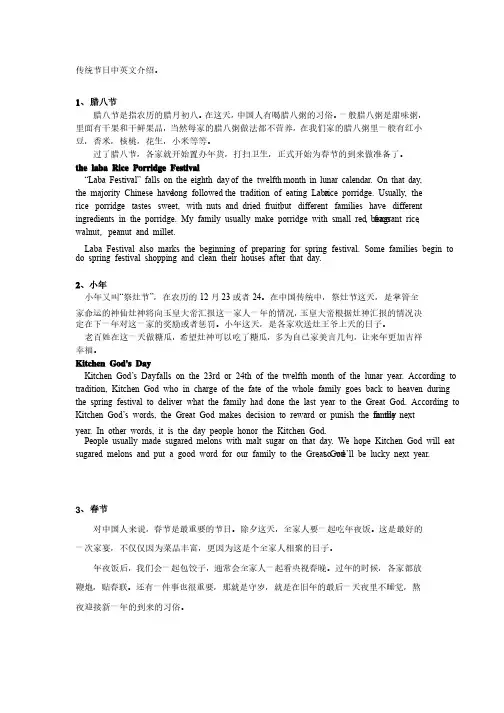
传统节日中英文介绍。
传统节日中英文介绍。
1、 腊八节腊八节是指农历的腊月初八。
在这天,中国人有喝腊八粥的习俗。
一般腊八粥是甜味粥,里面有干果和干鲜果品,当然每家的腊八粥做法都不营养,在我们家的腊八粥里一般有红小豆,香米,核桃,花生,小米等等。
豆,香米,核桃,花生,小米等等。
过了腊八节,各家就开始置办年货,打扫卫生,正式开始为春节的到来做准备了。
过了腊八节,各家就开始置办年货,打扫卫生,正式开始为春节的到来做准备了。
the laba Rice Porridge Festival“Laba Laba Festival” Festival” Festival” falls falls falls on on on the the the eighth day eighth day of of the twelfth the twelfth month month in in in lunar lunar lunar calendar. calendar. calendar. On On On that that that day, day, the majority Chinese have long followed the tradition of eating Laba rice rice porridge. porridge. porridge. Usually, Usually, Usually, the the rice porridge tastes sweet, with nuts and dried fruit, but different families have different ingredients in the porridge. My family usually make porridge with small red beans ,fragrant rice ,walnut ,peanut and millet. Laba Festival also marks the beginning of preparing for spring festival. Some families begin to do spring festival shopping and clean their houses after that day. 2、小年小年又叫“祭灶节”,在农历的12月23或者24。
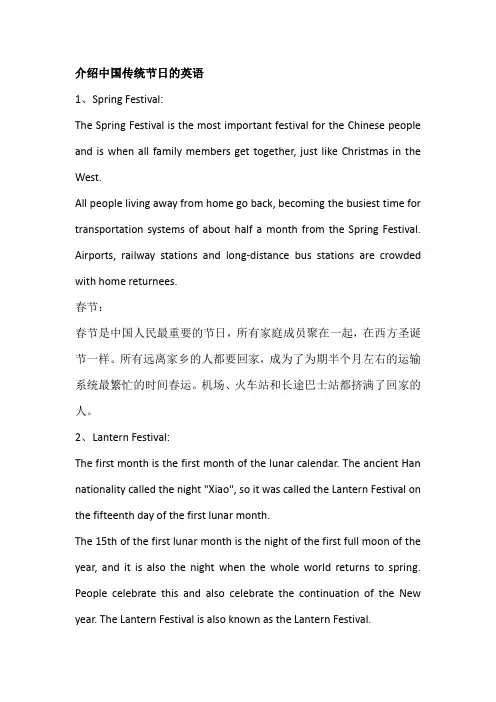
介绍中国传统节日的英语1、Spring Festival:The Spring Festival is the most important festival for the Chinese people and is when all family members get together, just like Christmas in the West.All people living away from home go back, becoming the busiest time for transportation systems of about half a month from the Spring Festival. Airports, railway stations and long-distance bus stations are crowded with home returnees.春节:春节是中国人民最重要的节日,所有家庭成员聚在一起,在西方圣诞节一样。
所有远离家乡的人都要回家,成为了为期半个月左右的运输系统最繁忙的时间春运。
机场、火车站和长途巴士站都挤满了回家的人。
2、Lantern Festival:The first month is the first month of the lunar calendar. The ancient Han nationality called the night "Xiao", so it was called the Lantern Festival on the fifteenth day of the first lunar month.The 15th of the first lunar month is the night of the first full moon of the year, and it is also the night when the whole world returns to spring. People celebrate this and also celebrate the continuation of the New year. The Lantern Festival is also known as the Lantern Festival.元宵节:正月是农历的元月,古代汉族称夜为“宵”,所以称正月十五为元宵节。
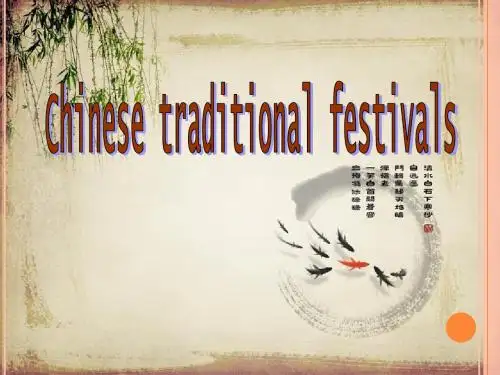
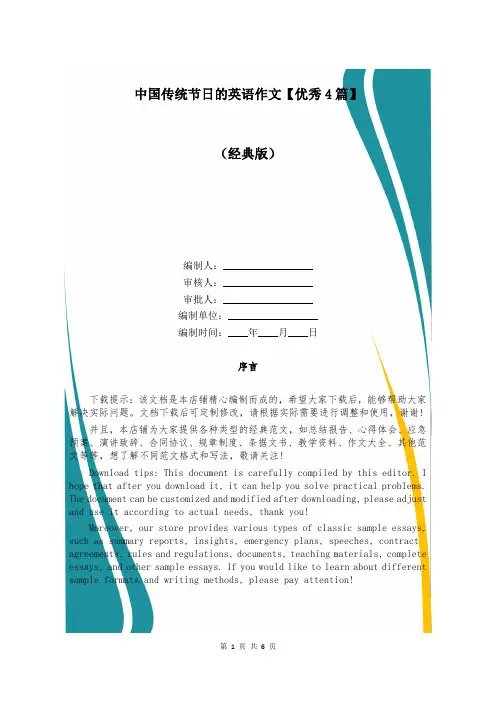
中国传统节日的英语作文【优秀4篇】(经典版)编制人:__________________审核人:__________________审批人:__________________编制单位:__________________编制时间:____年____月____日序言下载提示:该文档是本店铺精心编制而成的,希望大家下载后,能够帮助大家解决实际问题。
文档下载后可定制修改,请根据实际需要进行调整和使用,谢谢!并且,本店铺为大家提供各种类型的经典范文,如总结报告、心得体会、应急预案、演讲致辞、合同协议、规章制度、条据文书、教学资料、作文大全、其他范文等等,想了解不同范文格式和写法,敬请关注!Download tips: This document is carefully compiled by this editor. I hope that after you download it, it can help you solve practical problems. The document can be customized and modified after downloading, please adjust and use it according to actual needs, thank you!Moreover, our store provides various types of classic sample essays, such as summary reports, insights, emergency plans, speeches, contract agreements, rules and regulations, documents, teaching materials, complete essays, and other sample essays. If you would like to learn about different sample formats and writing methods, please pay attention!中国传统节日的英语作文【优秀4篇】根据中文大意和英语提示词语,写出意思连贯、符合逻辑、不少于60词的短文。
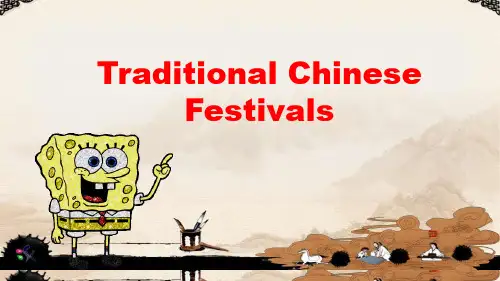
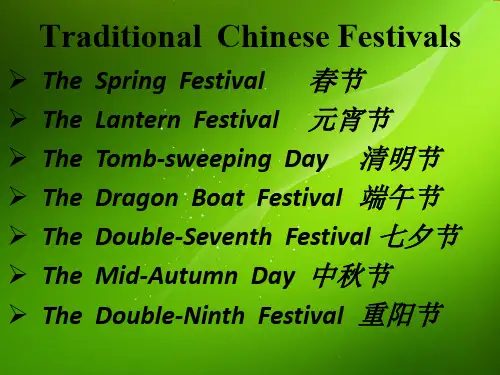
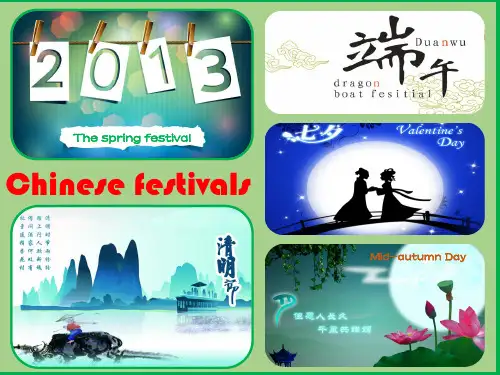
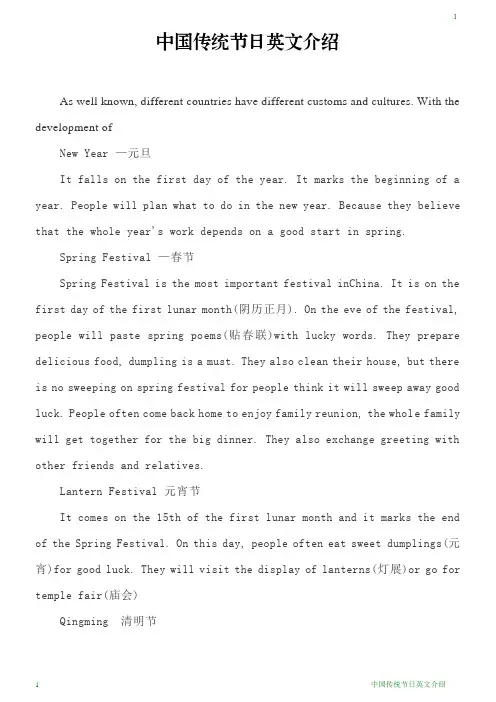
中国传统节日英文介绍As well known, different countries have different customs and cultures. With the development ofNew Year —元旦It falls on the first day of the year. It marks the beginning of a year. People will plan what to do in the new year. Because they believe that the whole year's work depends on a good start in spring.Spring Festival —春节Spring Festival is the most important festival inChina. It is on the first day of the first lunar month(阴历正月). On the eve of the festival, people will paste spring poems(贴春联)with lucky words. They prepare delicious food, dumpling is a must. They also clean their house, but there is no sweeping on spring festival for people think it will sweep away good luck. People often come back home to enjoy family reunion, the whole family will get together for the big dinner. They also exchange greeting with other friends and relatives.Lantern Festival 元宵节It comes on the 15th of the first lunar month and it marks the end of the Spring Festival. On this day, people often eat sweet dumplings(元宵)for good luck. They will visit the display of lanterns(灯展)or go for temple fair(庙会)Qingming 清明节Qingming —It is also called Tomb-Sweeping Day. It falls on April 4th or 5th . That is a special day for the living to show love and respect to their dead friends or relatives. People often go to sweep the tomb and put the meat, wine in front of the tomb. One interesting thing is that people burn the paper money for the dead.Dragon Boat Festival 端午节This day is on the fifth of the fifth lunar month, People often get together to watch the wonderful “Dragon Boat Race”(龙舟大赛),Rice dumpling is a must on Dragon Boat Festival.Mid-autumn Day —中秋节It comes on the 15th of the eighth lunar month. People often gaze at the “Lady in the moon”(嫦娥) and eat moon cakes.中国传统节日英文介绍1. Spring FestivalSpring Festival is known as the most important Festival in China. During the holiday, people go back to hometown from everywhere no matter how far the distance is. They prepare various delicious food and presents for the Spring Festival Eve. Chinese will have a happy family union in the Spring Festival Eve, they believe that’s the end day of last year and they will stay up for good luck until the first day of next year.In China, the most traditional and popular Spring Festival food is dumpling, which looks like the moon with vegetables and meat mixed in it. The Chinese name of dumpling is “JIAO ZI”, ”JIAO”means ”cross”, ”ZI”is Chinese traditional time represents “24:, so the Chinese word “JIAO ZI”means “cross 24:, just the dividing point of last year and nextyear. So when it comes to 24:00, every family begins eating dumplings. Firecracker is also necessary for Spring Festival, the story of Firecracker is: Long ago, in a small village, there appeared a savage animal called “NIAN”, this animal always came out to eat people in the Eve. One day, villagers found three things can make “NIAN”scared: Red color, Fire and noise. So when “NIAN”came again, villagers put up red paper on the door and set firecracker everywhere. After that, “NIAN”disappeared from that village. Now putting up red paper on the door and setting firecracker becomes Spring Festival customs and people believe doing these will bring their family safety.Spring Festival is also the happiest time for children, because they can get red envelope containing money as a gift from the elder. During the Spring Festival, any unfortunate word cannot be heard because it will make people upset and unhappy. People also make use of this holiday to visit their relatives and bring them some presents and well-wishing.2. The Lantern FestivalThe Lantern Festival is January 15 on the lunar calendar. The lunar January is the first month of a year and 15this the first day of full moon. Therefore, Lantern Festival is an important Festival right after Spring Festival.During Lantern Festival, people go along the street to watch lanterns and children light their own small lanterns for some fun. The biggest and most beautiful lantern is the dragon lantern, which looks like a flying dragon, held by several young guys. One with a ball in hand leads the dragon to move.Some lanterns have puzzles on them, called lantern puzzle, the one who gets the answer could receive small presents and be happy for his intelligence.The traditional food for Lantern Festival is rice glue ball. Rice glue ball is a flavor ball with filling in it, for example, peanut filling, sesame filling and jam filling…,the rice glue ball’s shape is just like the full moon appears in the sky. This kind of dessert is especially welcomed by children.3. Tomb- sweeping DayTomb–sweep Day is an ancient festival in spring, also called Qing Ming Festival. In ancient China, the emperor worshipped heaven and earth in order to bless for harvest. People worshipped their ancestors with sacrifice and showed their missing for ancestors.Tomb-sweeping Day, are always rainy days, just like the sky crying for dead people. A Chinese poem described as following:Qing Ming usually comes with rainy daysPassengers on the way are full of sorenessI ask a Buffalo boy for tavern to release my sadnessHe points to the village covered by apricot blossomsThis poem “The Day of Qing Ming”is written by a poet called Du Mu in Tang Dynasty. Qing Ming Festival is the day to worship his mother with family, but the writer goes alone in the rainy days as a passenger far from his hometown, he felt deeply upset and sorrowed. He has to find a tavern to have a drink, perhaps in this way he will release himself from sadness.4. The Dragon Boat FestivalThe Dragon Boat Festival is in May 5thon the lunar calendar. The beginning of this festival is in memory of Qu Yuan, a wise minister and poet in Chu dynasty, who jumped into Mi Luo River in lunar May 5th for despair of country, unfair treat and defamation. People threw rice dumplings to River to protect his body from eating by fish and showed their respect for Qu Yuan’s noble spirit.In recent China, people also eat rice dumplings in Dragon Boat Festival. From the name, we can directly know the campaign of this festival is Dragon Boating. A team of strong men on the Dragon Boat will try their best to win 1st and show Chinese strongest spirits.People use moxa to clean themselves and use five-color thread crossing small children’s arms and fingers to keep illness far away.5. Mid-Autumn DayMid-autumn Day is August 15thon lunar calendar. According to history records, Chinese emperor has tradition that worship the Sun in spring and worship the Moon in autumn. As august 15this exactly the middle of autumn, so it is called Mid-Autumn DayThere are a lot of stories about the moon since ancient China.One most famous story is Chang’e flying to the moon. Thousands of years ago, there were 9 suns in the sky, many people felt too hot to live. A young man called Yi was brave enough and shot 8 suns to the ground and saved people. One day Yi got a potion of elixir from Queen Mother and gave his wife Chang’e to keep. A man named Peng Meng knew about the elixir and wanted to get it from Chang’e. One day when Yi wasout for hunting, Peng Meng went to rob the elixir. In order to protect the elixir, Chang’e swallowed all of the elixir then flied to the moon.In memory of Chang’e, she is recognized as the goddess of the moon.The traditional food of Mid-Autumn Day is Moon cake, a round baked cake with fillings in it. The round shape of moon cake represents family reunion. In the night of Mid-Autumn Day, every family has moon cake and watches the moon.6. The Double Ninth FestivalThe Double Ninth Festival is an important traditional Chinese festival in September 9thon lunar calendar. It is the ninth day of the ninth lunar month, ancient Chinese believes nine represents sun, the brightest thing, September 9th has two nine, the sun is doubled, so call it Double Ninth Festival. Nine also means Long in Chinese words, so the Double Ninth Festival is also recognized The Old Festival.In Double Ninth Festival, people go to their ancestors’tombs to worship with coat for winner.The campaign for Double Ninth Festival is climbing mountain and planting a kind of plant called “Zhu Yu”. A poem written by famous Tang dynasty poet Wang Wei is as following:I stay alone as a visitor in a country foreignThe festival makes me feel homesick and missingMy brothers must have already climbed to High MountainEveryone can plant ZhuYu there except me, a lonely personThis poem’s name is “On the Double-ninth Day thinking of my brothers”. This poem is full of sadness and homesick.In autumn, chrysanthemum is in blossom. People can look at the beautiful flowers and climb mountains as they like.。
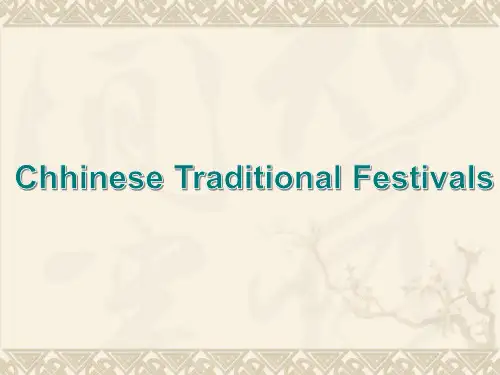
关于中国传统节日英文介绍Chinese traditional festivals are an integral part of the country's rich cultural heritage. These festivals are steeped in history, tradition, and mythology, and are celebrated with great enthusiasm and joy across China. Here are a few of the most significant Chinese traditional festivals:1. Spring Festival (Chinese New Year): This is the most important festival in China, marking the start of the lunar calendar. It is a time for family reunion, delicious feasts, giving red envelopes filled with money, and traditionally lighting firecrackers to ward off evil spirits.2. Lantern Festival: Celebrated on the 15th day of the lunar calendar, Lantern Festival marks the end of the Chinese New Year celebrations. During this festival, colorful lanterns are lit and displayed, there are lion and dragon dances, and locals enjoy solving riddles written on lanterns.3. Dragon Boat Festival: Held on the 5th day of the 5th lunar month, this festival commemorates the death of a patriotic poet called Qu Yuan. Dragon boat races are held across the country, and people feast on sticky rice dumplings wrapped in bamboo leaves called zongzi.4. Mid-Autumn Festival (Mooncake Festival): This festival is celebrated on the 15th day of the 8th lunar month, when the moon is at its brightest. Families gather together to enjoy mooncakes, a rich pastry filled with sweet bean or lotus seed paste, and appreciate the full moon.5. Qingming Festival (Tomb-Sweeping Day): Taking place around April 4th, this festival is an occasion to honor ancestors by visiting their graves, cleaning tombstones, and making offerings. It is also a time for outdoor activities, such as flying kites, and appreciating the beauty of spring.These festivals are not only significant cultural events but also an opportunity for Chinese people to connect with their roots and pass down traditions to younger generations. They showcase the country's deep sense of community, respect for ancestors, and appreciation for nature.。
中国传统节日No. 1 春节春节,也被称为农历新年。
对于中国人来说,这是规模最大,最重要的传统节日。
就如同西方的圣诞节一样,春节是一家团聚的日子。
The Spring Festival is also called Chinese Lunar New Year. Being one of the traditional Chinese festivals, it is the grandest and most important festival for Chinese people. It is also the time for whole families to get together, which is similar to Christmas for Westerners.春节从农历新年第一天开始,几乎要持续半个月。
但在民间传统中,这一节日从腊月23日就开始了,一直到正月十五(元宵节)。
It comes on the first day of Chinese lunar calendar and lasts for almost half of a month. But in folk custom, this traditional holiday lasts from the 23rd day of the twelfth month to the 15th day of the first month (The Lantern Festival) on the lunar calendar.大年三十(除夕夜):团圆饭就除夕夜而言,无论身在何处,也不管路途多么遥远,人们都会设法赶回家,所以除夕夜的盛大晚餐也叫做“团圆饭”。
每个家庭的团圆饭都是一年中精心准备的最华丽和隆重的家宴。
女主人在餐桌上摆满精心准备的食物,全家人围坐一起分享美味佳肴,然后一起乐融融地包饺子。
午夜12点,每个家庭都会放鞭炮,辞旧迎新。
中国传统节日介绍英文版Chinese Traditional FestivalsChinese culture is rich and diverse, and one of its most distinctive features is its traditional festivals. These festivals, deeply rooted in Chinese history, reflect the customs, beliefs, and values of the Chinese people. In this article, we will introduce some of the most significant Chinese traditional festivals.1. Spring Festival (Chinese New Year)The Spring Festival, also known as Chinese New Year, is the most important and widely celebrated festival in China. It marks the beginning of the lunar calendar and usually falls in January or February. During this festival, families come together for feasts, exchange gifts, and set off fireworks. The highlight of the Spring Festival is the Dragon and Lion Dance, in which performers mimic the movements of these mythical creatures to bring good luck and ward off evil spirits.2. Lantern FestivalThe Lantern Festival marks the end of the Chinese New Year celebrations. It takes place on the fifteenth day of the lunar calendar, symbolizing the first full moon of the year. People hang decorative lanterns, solve riddles written on lanterns, and eat sweet rice dumplings called tangyuan. The skies are adorned with beautiful flying lanterns that create a magical atmosphere.3. Dragon Boat FestivalThe Dragon Boat Festival, also known as Duanwu Festival, is celebrated on the fifth day of the fifth lunar month. This festival commemorates the ancient poet Qu Yuan and commemorates his suicide by drowning himself in a river. Dragon boat races are held to reenact the search for Qu Yuan's body and to pay homage to him. People also eat sticky rice dumplings wrapped in bamboo leaves called zongzi during this festival.4. Mid-Autumn FestivalThe Mid-Autumn Festival, also known as the Moon Festival, is celebrated on the fifteenth day of the eighth lunar month. It is a time for families to gather and appreciate the full moon while eating mooncakes. Mooncakes are traditionally filled with sweet bean paste or lotus seed paste and often contain a salted egg yolk symbolizing the moon. The festival also includes lantern displays and the exchange of small gifts.5. Qingming Festival (Tomb-Sweeping Day)Qingming Festival, also known as Tomb-Sweeping Day, is a time to honor deceased ancestors. It usually occurs on April 4th or 5th of each year. During this festival, families visit the graves of their ancestors to clean and tidy the tombstones, make offerings, and burn incense. It is also a time for people to enjoy outdoor activities such as flying kites and hiking.6. Double Ninth FestivalThe Double Ninth Festival, also known as Chongyang Festival, is celebrated on the ninth day of the ninth lunar month. As the name suggests, this festival falls on a day with a double yang (阳) numerical order, which symbolizes strength and fortune. On this day, people often climb mountains,fly kites, and drink chrysanthemum wine to ward off evil spirits and pray for good health and longevity.7. Winter Solstice FestivalThe Winter Solstice Festival, also known as Dongzhi Festival, is celebrated on the shortest day and longest night of the year, around December 21st. It is a time for families to get together and enjoy a special meal. Tangyuan, a sweet glutinous rice ball, is a traditional food during this festival. Eating tangyuan symbolizes family reunion and the arrival of longer days as we move into winter.In conclusion, Chinese traditional festivals hold great significance in the hearts of the Chinese people, serving as a means to connect with their cultural roots, strengthen family ties, and express their hopes and wishes. The festivals mentioned above are just a glimpse into the rich tapestry of Chinese traditions, each with its unique traditions, customs, and beliefs. By celebrating these festivals, the Chinese people pass down their heritage from generation to generation, ensuring that their cultural identity remains alive and vibrant.。
各种中国传统节日的英文介绍
以下是几个中国传统节日的英文介绍:
1.春节(Spring Festival):春节是中国最重要的传统节日,通常在农历正
月初一庆祝。
这个节日标志着新年的开始,人们会进行一系列的庆祝活动,如贴春联、吃团圆饭、放烟花爆竹等。
2.元宵节(Lantern Festival):元宵节是春节之后的第一个重要节日,通常
在农历正月十五庆祝。
这个节日主要是庆祝春节后的第一个满月,人们会吃元宵、赏花灯、猜灯谜等。
3.清明节(Qingming Festival):清明节是中国传统的祭祀节日,通常在公
历4月4日或5日庆祝。
这个节日是祭祖和扫墓的日子,人们会去祭拜祖先、献上鲜花、焚香等。
4.端午节(Dragon Boat Festival):端午节是中国传统节日之一,通常在农
历五月初五庆祝。
这个节日主要是为了纪念古代爱国诗人屈原,人们会赛龙舟、吃粽子、喝雄黄酒等。
5.中秋节(Mid-Autumn Festival):中秋节是中国传统节日之一,通常在
农历八月十五庆祝。
这个节日是庆祝秋收的日子,人们会赏月、吃月饼、猜灯谜等。
6.重阳节(Double Ninth Festival):重阳节是中国传统节日之一,通常在
农历九月初九庆祝。
这个节日主要是为了祈求长寿和平安,人们会登高、赏菊、吃重阳糕等。
以上是一些中国传统节日的英文介绍,希望能够帮助到您。
中国传统节日(中英文对照)中国传统节日(中英文对照简介)目录The Spring Festival(春节)Lantern Festival(元宵节)Qingming Festival(清明节)Dragon Boat Festival(端午节)Double Seventh Festival(七夕)Mid-Autumn Festival(中秋节)Double Ninth Festival(重阳节)Winter Solstice Festival(冬至)together to have dinner while watching TV programs.For Chinese at home and abroad, the Spring Festival is always the most important festival.农历的正(zheng)月初一,是中国的农历新年。
在中国的传统节日中,这是一个最重要、最热闹的节日。
因为过农历新年的时候,正是冬末春初,所以人们也把这个节日叫“春节”。
中国人过春节有很多传统习俗。
从腊月二十三起,人们就开始准备过年了。
在这段时间里,家家户户要大扫除,买年货,贴窗花,挂年画,写春联,蒸年糕,做好各种食品,准备辞旧迎新。
春节的前夜叫“除夕”。
除夕之夜,是家人团聚的时候。
一家人围坐在一起,吃一顿丰盛的年夜饭,说说笑笑,直到天亮,这叫守岁。
除夕零点的钟声一响,人们还要吃饺子。
古时候叫零点为“子时”,除夕的子时正是新旧年交替的时候,人们在这时吃饺子,是取“更岁交子”的意思。
这也是“饺子”名称的由来。
过了除夕就是大年初一。
从初一开始,人们要走亲戚、看朋友,互相拜年。
拜年,是春节的重要习俗。
拜年时,大家都要说一些祝愿幸福、健康的吉祥话。
放爆竹是春节期间孩子们最喜欢的活动。
传说燃放爆竹可以驱妖除魔,所以每年从除夕之夜起,到处就响起了接连不断的爆竹声。
阵阵烟花,声声爆竹,给节日增添了喜庆的气氛。
中国传统节日相关英语知识English:Chinese traditional festivals are an integral part of the culture and heritage of the country. Some of the most well-known festivals include the Spring Festival (Chinese New Year), Mid-Autumn Festival, Dragon Boat Festival, and Qingming Festival. The Spring Festival, which falls on the first day of the Chinese lunar calendar, marks the beginning of the new year and is a time for families to come together for reunion dinners and cultural activities. The Mid-Autumn Festival, also known as the Mooncake Festival, is celebrated on the 15th day of the eighth month of the lunar calendar when families gather to admire the full moon and enjoy mooncakes. The Dragon Boat Festival, on the fifth day of the fifth month of the lunar calendar, is known for its dragon boat races and the eating of zongzi, a traditional glutinous rice dish wrapped in bamboo leaves. The Qingming Festival, also known as Tomb-Sweeping Day, is a time to honor ancestors by visiting their graves, cleaning the tombstones, and making offerings of food and paper items. These festivals are not only important for traditional practices and rituals but also serveas occasions for bringing families and communities together to celebrate and preserve their cultural heritage.中文翻译:中国传统节日是这个国家文化和遗产的重要组成部分。